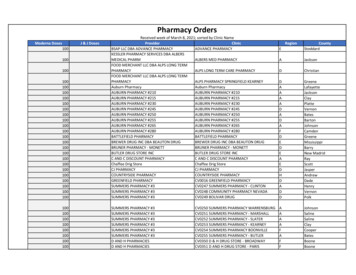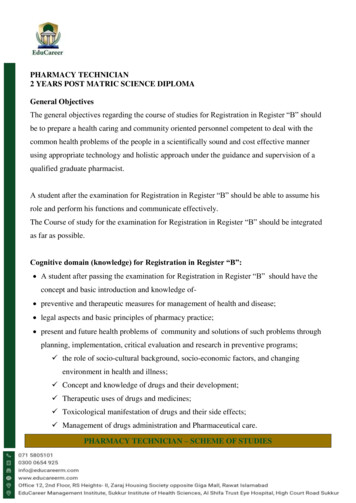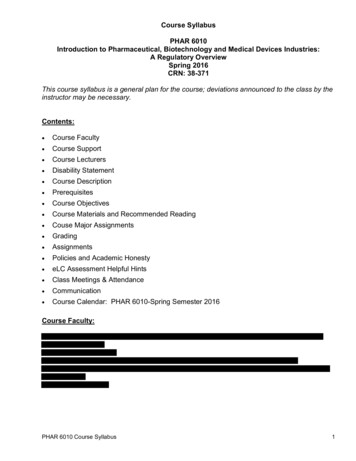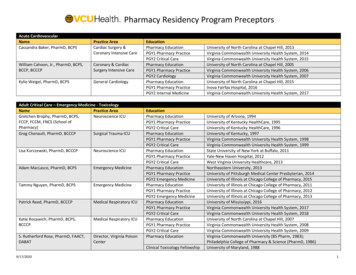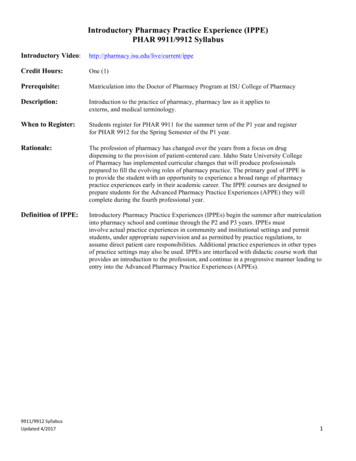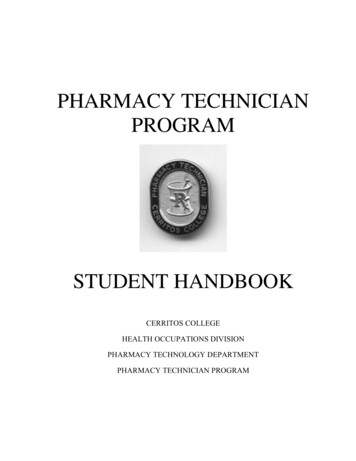
Transcription
PHAR 6778: LAW IN PHARMACY PRACTICESyllabusSpring 20200.7 CreditJanuary 27 – May 8, 2020Location & TimeOnlineInstructor InformationCourse Director:Cody Wiberg, Pharm.D., M.S., R.Ph.Office: Off campusOffice Hours: By appointmentOffice Phone: 651-888-9197E-Mail: wiber003@umn.edu or ccwiberg7@gmail.com (preferred)Co-Director:Jennell C. Bilek, J.D., Pharm.D., Ph.D.Office: Off campusOffice Hours: By appointmentOffice Phone: 612-436-9648E-Mail: jbilek@carlsoncaspers.com (please use this email address)Required Reading MaterialsThere is no required textbook to purchase. Links to reading materials for each module(two-week period) are supplied in the Assignments section below. However, studentsalso have free access to Pharmacy Practice and the Law (Abood and Burns). For thepurposes of passing the MPJE, it would be advantageous for students to read theoptional portions of this textbook, as described in each module.COURSE DESCRIPTIONThe course covers both federal and state laws and regulations that have an impact on thepractice of pharmacy.COURSE OBJECTIVESUpon completion of the course, the student will understand the primary federal and statelaws and regulations that govern the practice of pharmacy. Students will be exposed to: Brief overview of the legal system including nature and sources of U.S. law, anddistinguishing administrative, federal, and state law.
The Federal Food, Drug, and Cosmetic Act, related Amendments, and otherimportant federal laws governing medications.Those portions of the Federal and State Controlled Substances Acts that are mostpertinent to the practice of pharmacy.Brief overview of federal regulation of medications covering development,production, dispensing, controlled substances, and marketing issues.Overview of the federal regulation of pharmacy practice.Overview of pharmacist negligence and other liability concerns facingpharmacists.State regulation of pharmacy practice and pharmacy professionals including, butnot limited to, Minnesota Rules (Chapter 6800) dealing with licensing, continuingeducation, pharmacy operations, and operations in institutions.Minnesota Pharmacy Practice and Wholesale Distribution Act. (Chapter 151)EXPECTATIONSGeneral: All students are expected to view lectures and read the assigned readings. Pleaserefer to the syllabus as a guide in preparing for each lecture.Grading Policy: Weekly quizzes and one final examination form the basis of the finalgrade. The final examination constitutes 50% of your final grade. Weekly multiplechoice quizzes in modules 1-5 each count for 10% of your final grade.Final Exam:The final exam will be scheduled during finals week. It will be available on Canvas for aminimum of eight hours, and it must be completed during this window. The final examwill consist entirely of multiple-choice questions. The final exam is CLOSED BOOK—the use of any printed or electronic materials or consulting with anyone during or after theexam is strictly prohibited and will result in an Honor Code violation. Students maysubmit correction requests via email regarding the final examination. The request mustinclude an explanation of why and where a change is required. Any such requests mustoccur within five days of the examination.Grade Scale:Final grades will be rounded to the nearest whole number using common rounding rules (asper Microsoft Excel where values 0.5 are rounded up). Letter grade assignmentsappearing on transcripts will reflect the table below.AB BCDF93-100%87-89%80-82%73-76%60-69% 60%ABC C-90-92%83-86%77-79%70-72%2
Grading Curve:The final grades in this course will be adjusted on a curve.Honor Code: Each student is bound by the following specific provisions of the HonorCode: Academic misconduct is any unauthorized act which may give a student an unfairadvantage over other students, including but not limited to: falsification, plagiarism,misuse of test materials, receiving unauthorized assistance and giving unauthorizedassistance.Proper Use of Course Materials: The lectures will be made available to you online.Recording, downloading, distributing or reposting the lectures and quizzes is a violation ofthe Honor Code and will result in an automatic “F” in PHAR 6778. Lecture handouts willalso be available on Canvas. These handouts, and any other course materials, may not bedistributed to any person not enrolled in PHAR 6778 during the Spring 2020 semester.VIOLATIONS OF THE HONOR CODE WILL AT THE VERY LEAST RESULT IN THE STUDENTFAILING THIS COURSE.Use of Materials During Quizzes and the Final Exam: Students are encouraged to usetheir textbook or other materials for the weekly quizzes. Students may not work togetheron quizzes—consulting other individuals during a quiz or discussing a quiz after it hasbeen completed will result in an Honor Code violation. While course materials may beconsulted during the quiz, the use of course materials is strictly prohibited during the finalexamination.Course Evaluations: Students will have an opportunity to complete online courseevaluations for instructors and the course itself (including instructional strategies, etc.) atthe end of the semester. You are encouraged to contact the course director any time youhave concerns about the course or your progress in the course.Disability Accommodations: It is University policy to provide, on a flexible andindividualized basis, reasonable accommodations to students who have documenteddisability conditions (e.g., physical, learning, psychiatric, vision, hearing, or systemic) thatmay affect their ability to participate in course activities or to meet course requirements.Students with disabilities are encouraged to contact Disability Services and theirinstructors for a confidential discussion of their needs.On the Duluth campus Disability Services is located in Kirby Student Center (KSC),Rooms 256-258, telephone: 218.726.8217 or 218.726.7380 TTY/TDD. On the TwinCities campus Disability Services is in Suite 180 McNamara Alumni Center, 200 OakStreet, telephone: 612.626.1333 voice or TTY.Additional Information: Instructors reserve the right to modify the contents or sequenceof the syllabus, including reading assignments at any time during the semester. It is thestudent’s responsibility to be aware of these changes. The primary form of communication3
is email. Students must check their University of Minnesota email regularly. Forinformation that applies to all courses, please review the following document: University of Minnesota and College of Pharmacy Central SyllabusMinnesota Board of Pharmacy Statutes and Rules via internet at:Board of Pharmacy Rules: https://www.revisor.mn.gov/rules/?id 6800Minn. Stats. Chapter 151 (Pharmacy Practice and Wholesale Drug Distribution Acts):https://www.revisor.mn.gov/statutes/?id 151.Minn. Stats. Chapter 152 (Controlled Substances Act):https://www.revisor.mn.gov/statutes/?id 152.Students may purchase paperback books of the Minnesota Statutes and Rules throughMinnesota’s Bookstore or access the Rules and Statutes through the links above. Notethat for the purposes of this course, students will only be responsible for reading thespecific statutes and rules noted below under assignments. However, refer to the MPJEInformation section for recommendations on what to study for that examination.ASSIGNMENTSModule 1 (Two weeks starting 1/27) (Bilek) – Introduction to Law and the Legal System;NegligencePrior to class: Read Outline of the U.S. Legal System. (Bureau of International InformationPrograms United States Department of State – 2004); pages 6 – 17. (The rest ofthe document is optional). Read Negligence (Legal Information Institute - Cornell Law School) Read Minn. Stats. §151.01 Read OBRA at Sweet Sixteen: A Retrospective ReviewOptional: Read Abood Chapter 1, pages 2-40Read Abood Chapter 8, pages 425-466Quiz 1 due 2/7/20204
Module 2 (Two weeks starting 2/10) (Bilek) – Federal Regulation of Medications:Development, Production and Marketing & Federal Regulations of Medications:Dispensing and CompoundingPrior to class: Read Food, Drug & Cosmetic Act Summary. Pharmacy Law—Examination andBoard Review; Feinberg, William. Available on Access Pharmacy. Read Poison Prevention Packaging Act. Pharmacy Law—Examination and BoardReview; Feinberg, William. Available on Access Pharmacy. Read Minn. Stat. § 151.253 (compounding) Read Minn. Stat. § 151.01 (compounding and dispensing definitions) Read Official General USP Chapter 795 and Chapter 797 (last revised 2014).Please download a free copy of these Chapters from USP at the links above. Read the documents under “Human Drug Compounding” accessible on the lefthand side of the Web page. Read: Warning Letter Resurrects Issue of Makena and FDA’s Use of EnforcementDiscretion Skim: https://www.fda.gov/media/132003/download Read the following article: l: Read Abood Chapter 2, pages 41-104Read Abood Chapter 3, pages 158-165 (Pharmacy Compounding Versus Manufacturing)Quiz 2 due 2/21/2020Module 3 (Two weeks starting 2/24) (Wiberg) – Federal Regulation of PharmacyPractice & State Regulation of Pharmacy PracticePrior to class: Read Minn. Rules 6800.0910 Patient Access to Pharmacist. Read Minn. Rules 6800.3110 Patient Medication Profiles. Read Minn. Stats. § 214.001 Policy and Regulation. Read Minn. Stats. § 151.02 State Board of Pharmacy. Read Minn. Stats. § 151.03 Membership. Read Minn. Stats. § 214.02 Public Member, Defined. Read Minn. Stats. § 151.06 Powers and Duties.5
Optional: Read Abood Chapter 6, pages 305-313, 346-350, skim 324-340Read Abood Chapter 7Quiz 3 due 3/6/2020Spring Break: March 9 – 13, 2020Module 4 (Two weeks starting 3/23) (Wiberg) – Minnesota Board of Pharmacy StatutesPrior to class:Read Minnesota Statutes Chapter 151 (except for sections already read)Read Minnesota Statutes Chapter 214, sections: 214.075 (Criminal Background Checks) 214.077 (Temporary License Suspension) 214.10 (Complaint, Investigation & Hearing) 214.103 (Health-related Licensing Boards; Complaint, Investigation and Hearing) 214.31 – 214.37 (Health Professionals Services Program)Quiz 4 due 4/3/2020Module 5 (Two weeks starting 4/6) (Wiberg) – Minnesota Board of Pharmacy RulesPrior to class: Read Minnesota Rules 6800.0200 – 1050 (LicensingPharmacies) Read Minnesota Rules 6800.1500 – 1600 (ContinuingEducation) Read Minnesota Rules 6800.2150 – 4075 (Operation of Pharmacies) Read Minnesota Rules 6800.6100 – 6800 (Operation in Long-Term CareFacilities) Read Minnesota Rules 6800.7100 – 7950 (Operations in Hospitals; HospitalService Policies) Read Minnesota Rules 6800.9950 – 9954 (Dispensing by Practitioners)Quiz 5 due 4/17/2020Module 6 (Two weeks starting 4/20) (Wiberg) – Federal and State Regulation ofControlled SubstancesPrior to class: Read Controlled Substances Act (CSA) Summary. Pharmacy Law—Examination and Board Review; Feinberg, William. Available on AccessPharmacy.6
Read Minn. Stats. §152.02, subd. 6 (portions related to restriction ofmethamphetamine precursor sales) Read Minnesota Statutes Sections 152.10-152.135 (Sales and Records;Prescriptions)Optional: Read Abood Chapter 4 Read Abood Chapter 5May 4th: Instructors will be on campus for a Law Review. 1:25 – 3:20PM WeaverDensford Hall.Note there is no quiz due this period. Consider using this time to prepare for the final exam.FINAL EXAM DURING WEEK OF MAY 11THHELPFUL RESOURCESMinnesota Rules online, Chapter 6800: esota Statutes online, Chapter 151: ota Statutes online, Chapter 152: ota Statutes online, Chapter 214: ota Statutes online, Chapter 148: https://www.revisor.mn.gov/statutes/cite/148MPJE INFORMATIONDue to time constraints, portions of Minnesota Rules, Statutes, and Abood (2016) will notbe covered in this course. This course will cover many topics you will be responsible foron the Multistate Pharmacy Jurisprudence Examination (MPJE). But there will bematerials we do not have time to cover, and it is your responsibility to fill in the blankswhile preparing for the MPJE.Know the following for the MPJE: Minnesota Rules Chapter 6800 – Know everything except 6800.4210 Minnesota Statuteso 151 (all)o 152.10 – 152.135o 214.027
oooo 214.03 sub. 1214.09214.31 – 214.36Review Chapter 148 (portions related to prescribing by nurses andoptometrists)Compounding requirements of USP Chapter 795 and Chapter 797. (Which youmay need to know for the NAPLEX as well). You can download a free copy ofthese Chapters from USPCollege of Pharmacy, Washington State University Review Questions about StateLaws & Regulations William E. Fassett, Ph.D., R.Ph.This Web site has a list of 77 questions about pharmacy law but has no answers –it isintended to be used as a study guide. If you can answer these questions for any state inwhich you are seeking licensure, you will have a better chance of passing the law estions-state-pharmacy-law-exams.pdf/MPJE details: Computer adaptive Combines federal and state specific law questions Questions tailored to the specific laws in each state Consists of 120 multiple-choice questions: 100 questions are used to calculate thetest score while 20 randomly dispersed questions serve as pretest questionsAmong other things, the MPJE tests candidates on: Legal aspects of pharmacy practice, including responsibilities with regard to thedistribution and dispensing of pharmaceuticals and for the care of patient Licensure, registration, certification, and operational requirements Regulatory structure and terms of the laws and rules that regulate or affectpharmacists, pharmacies, manufacturers, and distributorsPlease refer to https://nabp.pharmacy/programs/mpje/ for more information on the MPJE.8
Pharmacy Law—Examination and Board Review; Feinberg, William. Available on Access Pharmacy. —Read Poison Prevention Packaging Act. Pharmacy Law Examination and Board Review; Feinberg, William. Available on Access Pharmacy. Read Minn. Stat. § 151.253 (compounding) Read Minn. Stat. § 151.01 (compounding and dispensing definitions)
